2023 In-Demand Careers
THIS GUIDE IS NO LONGER ACTIVE. For the current FP Guide, click here.
University of San Diego Joan B. Kroc School of Peace Studies
Educating Students to Be Humanitarian Change Makers and Innovators
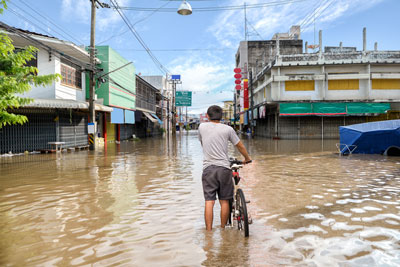
At a time of increasing risk for the world’s most vulnerable communities, a new master’s program created by USD Online and the University of San Diego Joan B. Kroc School of Peace Studies is providing recent college graduates and experienced professionals with the skills and knowledge to manage complex humanitarian emergencies with hope and innovation.
“Some may see humanitarian challenges as perennially intractable,” says Topher McDougal, professor of economic development and peacebuilding and academic director of the Master of Science in Humanitarian Action (MSHA). “At the Kroc School, we invite students to join us in a quest to solve problems that we don’t accept as intractable.”
Offered entirely online, the asynchronous program—the first humanitarian action master’s program housed in a school of peace studies—educates students who want to be engaged with disaster risk management, refugee resettlement, and humanitarian negotiations.
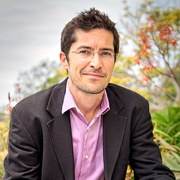
“At the Kroc School, we invite students to join us in a quest to solve problems that we don’t accept as intractable.” -Topher McDougal, Professor and Academic Director of the Master of Science in Humanitarian Action program, Joan B. Kroc School of Peace Studies, University of San Diego
Students who apply to the program are concerned about the impact of climate change, food insecurity, political conflict, and diseases like COVID-19 on marginalized communities. “Our students have felt impelled to help in some way with a crisis they’ve seen unfolding around them,” McDougal says.
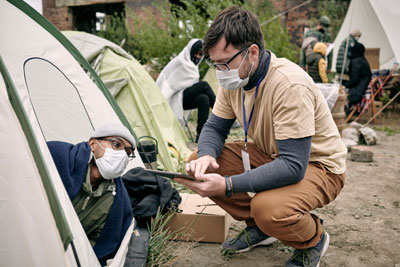 The program is designed for recent college graduates who have volunteer experience overseas, as well as professionals working outside the humanitarian field—perhaps an engineer or urban planner who wants to acquire the planning and logistical skills to help set up and administer camps for asylum seekers or those displaced by war, disease, or natural disasters.
The program is designed for recent college graduates who have volunteer experience overseas, as well as professionals working outside the humanitarian field—perhaps an engineer or urban planner who wants to acquire the planning and logistical skills to help set up and administer camps for asylum seekers or those displaced by war, disease, or natural disasters.
Given the University of San Diego’s long history of partnering with active-duty military, veterans, and their families, the MSHA program also draws members of the armed forces who are interested in participating in programs like Mercy Ships, which provides free medical care in countries around the world.
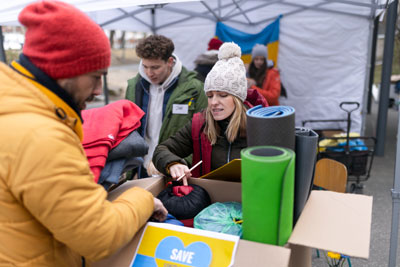 The MSHA program offers a capstone course that leverages the Kroc School’s focus on experiential learning and the university’s proximity to the US-Mexico border. A virtual reality enhanced simulation is being developed, with an anticipated launch of spring 2024, that will enable students to work in teams and experience the challenges of managing a hectic migrant shelter populated by about 2,000 people who have fled disasters in their native countries.
The MSHA program offers a capstone course that leverages the Kroc School’s focus on experiential learning and the university’s proximity to the US-Mexico border. A virtual reality enhanced simulation is being developed, with an anticipated launch of spring 2024, that will enable students to work in teams and experience the challenges of managing a hectic migrant shelter populated by about 2,000 people who have fled disasters in their native countries.
For MSHA graduates, there are expanding job opportunities with humanitarian and disaster relief organizations in the United States and overseas that include the US Agency for International Development’s Bureau for Humanitarian Assistance, Federal Emergency Management Agency, World Health Organization, CARE International, and Doctors Without Borders, among many others.
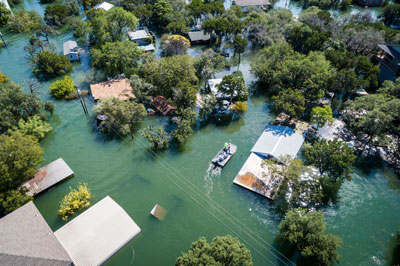 Empowering Students to Tackle Technical and Ethical Issues with Confidence
Empowering Students to Tackle Technical and Ethical Issues with Confidence
As a consultant for the humanitarian aid organization Mercy Corps, Professor Topher McDougal created a survey sampling frame as part of his analysis of the economic cost of conflict between herders and farmers in Nigeria. Drawing on his experience, he tasked his students with building their own sampling frames to gauge the scale of the economic cost and determine the parameters of the policy response. “This kind of assignment is very empowering and prepares students to perform when they get into the profession,” he says.
McDougal, who teaches courses on economic development, environmental peace and justice, and black markets, among others, is passionate about equipping students with “the confidence and competence they’ll need to tackle the technical and ethical challenges that await them.”
University of San Diego Joan B. Kroc School of Peace Studies
humanitarianaction.sandiego.edu
[email protected]
619-260-4580
Contents
- 2023 In-Demand Careers
- Johns Hopkins University School of Advanced International Studies
- John F. Kennedy School of Government at Harvard University
- University of San Diego Joan B. Kroc School of Peace Studies
- Texas A&M University, The Bush School of Government & Public Service
- University of Notre Dame, Keough School of Global Affairs
- The Fletcher School at Tufts University
- Georgetown University, Walsh School of Foreign Service
- Clinton School of Public Service at the University of Arkansas
- Rice University, School of Social Sciences